【单元一遍过】Unit 4 My day 复习课件(共31张PPT)
文档属性
| 名称 | 【单元一遍过】Unit 4 My day 复习课件(共31张PPT) |
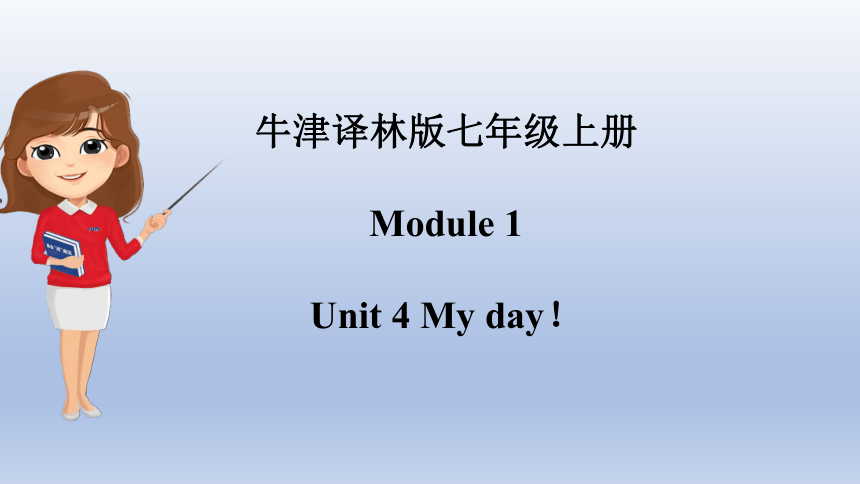
|
|
| 格式 | pptx | ||
| 文件大小 | 522.0KB | ||
| 资源类型 | 教案 | ||
| 版本资源 | 牛津译林版 | ||
| 科目 | 英语 | ||
| 更新时间 | 2023-07-13 16:02:34 | ||
图片预览

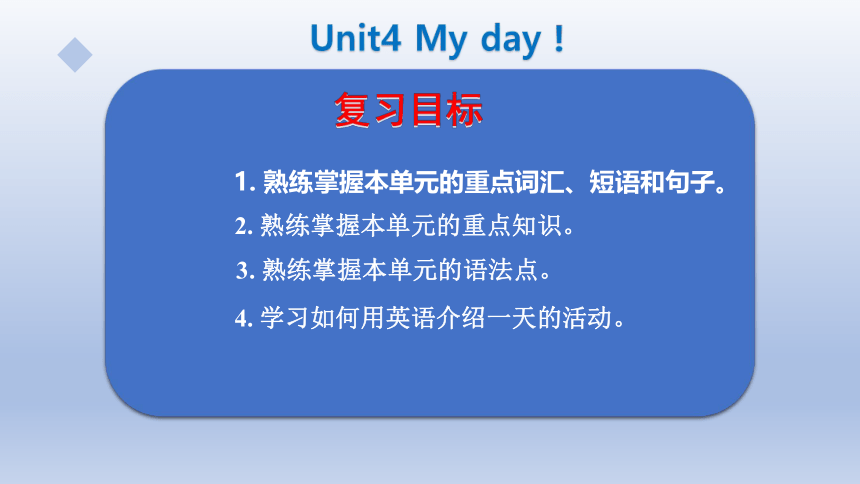
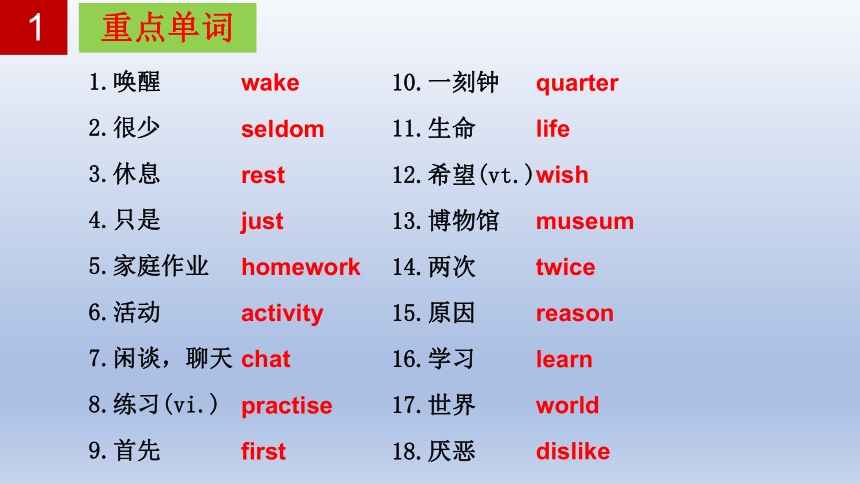
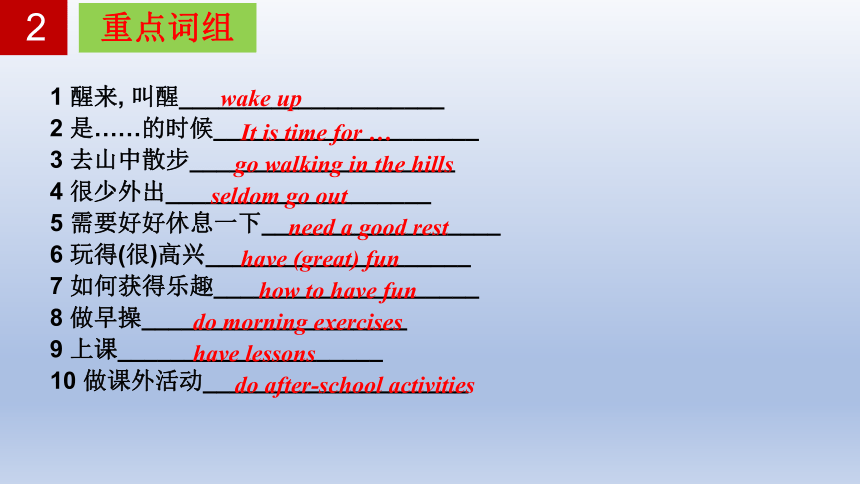
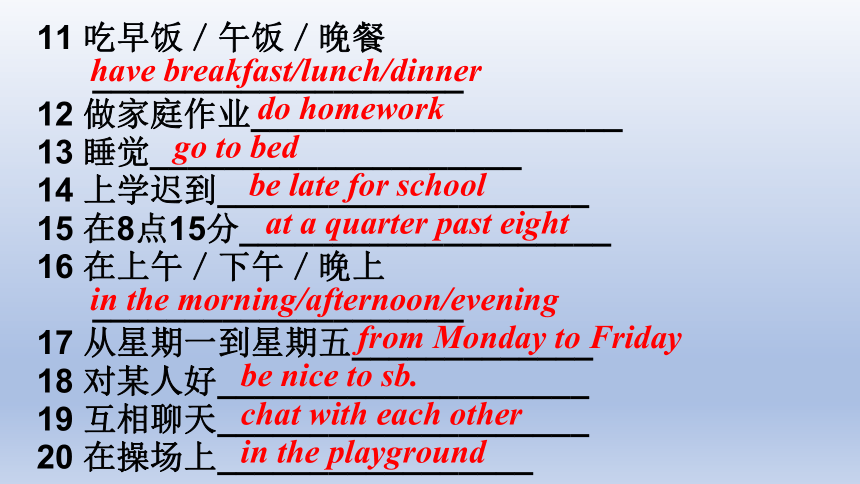
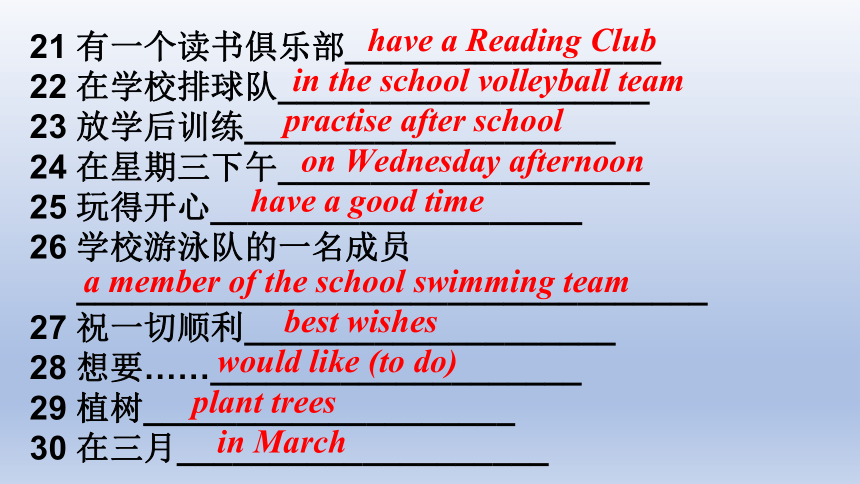

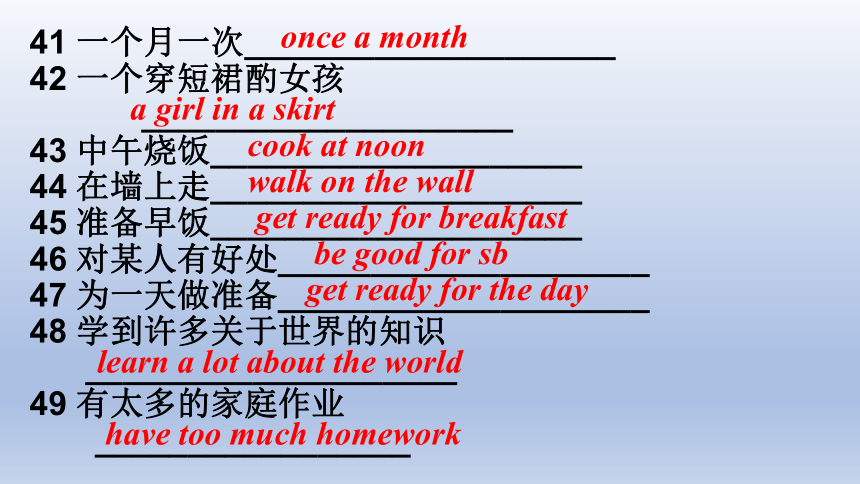
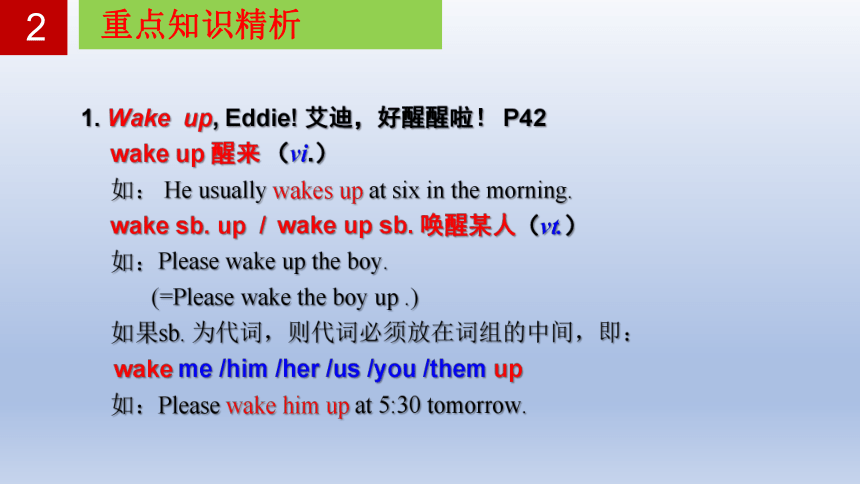
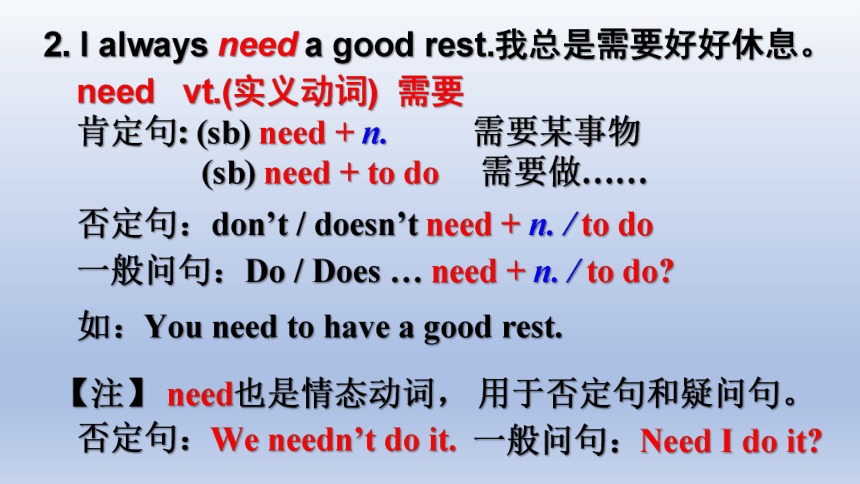
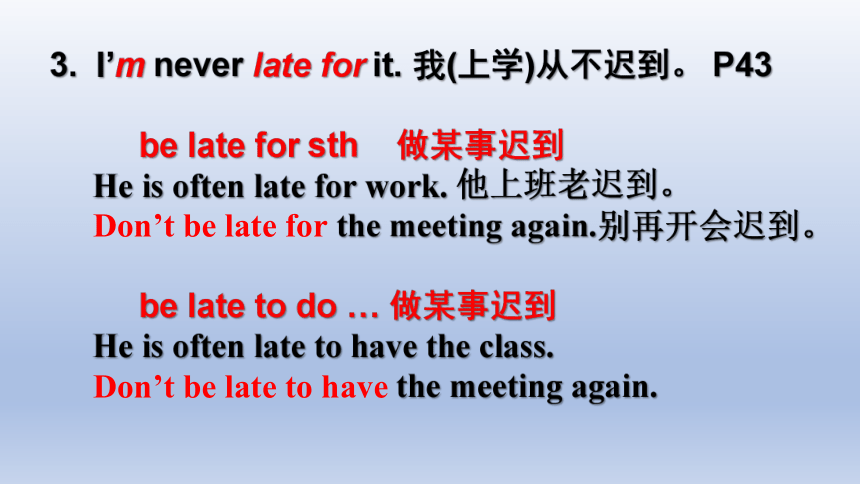
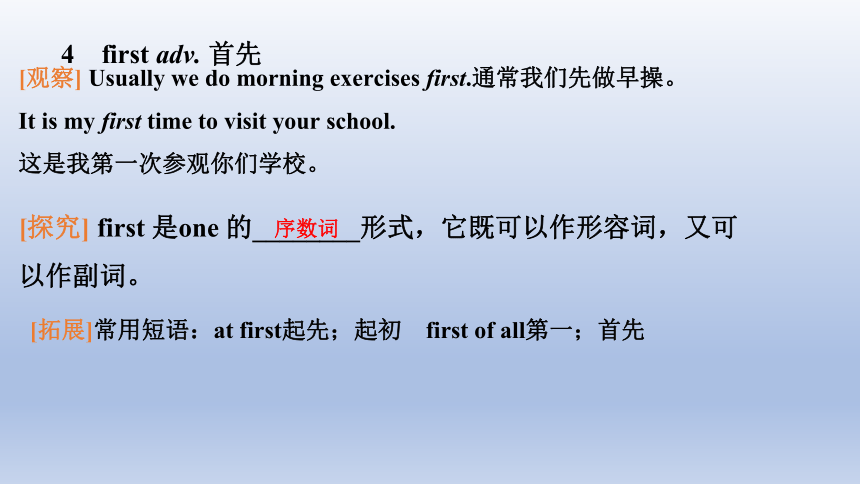
文档简介
(共31张PPT)
牛津译林版七年级上册
Module 1
Unit 4 My day!
目录页
1、单击此处添加标题
2、单击此处添加标题
3、单击此处添加标题
4、单击此处添加标题
5、单击此处添加标题
复习目标
1. 熟练掌握本单元的重点词汇、短语和句子。
3. 熟练掌握本单元的语法点。
4. 学习如何用英语介绍一天的活动。
2. 熟练掌握本单元的重点知识。
Unit4 My day!
1.唤醒
2.很少
3.休息
4.只是
5.家庭作业
6.活动
7.闲谈,聊天
8.练习(vi.)
9.首先
10.一刻钟
11.生命
12.希望(vt.)
13.博物馆
14.两次
15.原因
16.学习
17.世界
18.厌恶
wake
seldom
rest
just
homework
activity
chat
practise
first
quarter
life
wish
museum
twice
reason
learn
world
dislike
1
重点单词
1 醒来, 叫醒____________________
2 是……的时候____________________
3 去山中散步____________________
4 很少外出____________________
5 需要好好休息一下__________________
6 玩得(很)高兴____________________
7 如何获得乐趣____________________
8 做早操____________________
9 上课____________________
10 做课外活动____________________
wake up
It is time for …
go walking in the hills
seldom go out
need a good rest
have (great) fun
how to have fun
do morning exercises
have lessons
do after-school activities
2
重点词组
11 吃早饭/午饭/晚餐
____________________
12 做家庭作业____________________
13 睡觉____________________
14 上学迟到____________________
15 在8点15分____________________
16 在上午/下午/晚上
____________________
17 从星期一到星期五_____________
18 对某人好____________________
19 互相聊天____________________
20 在操场上_________________
have breakfast/lunch/dinner
do homework
go to bed
be late for school
at a quarter past eight
in the morning/afternoon/evening
from Monday to Friday
be nice to sb.
chat with each other
in the playground
21 有一个读书俱乐部_________________
22 在学校排球队____________________
23 放学后训练____________________
24 在星期三下午____________________
25 玩得开心____________________
26 学校游泳队的一名成员
__________________________________
27 祝一切顺利____________________
28 想要……____________________
29 植树____________________
30 在三月____________________
have a Reading Club
in the school volleyball team
practise after school
on Wednesday afternoon
have a good time
a member of the school swimming team
best wishes
would like (to do)
plant trees
in March
32 在星期六____________________
33 在星期天早上____________________
34 在儿童节____________________
35 在6岁开始上学____________________
36 因为…感谢____________________
37 告诉你关于我的生活情况
____________________
38 上3节课____________________
39 举行一场学校足球赛
____________________
40 有许多时间打网球
____________________
on Saturday
on Sunday morning
on Children's Day
start school at 6 years old
thanks for…
tell you about my life
have three lessons
have a school football match
have much time to play tennis
41 一个月一次____________________
42 一个穿短裙酌女孩
____________________
43 中午烧饭____________________
44 在墙上走____________________
45 准备早饭____________________
46 对某人有好处____________________
47 为一天做准备____________________
48 学到许多关于世界的知识
____________________
49 有太多的家庭作业
_________________
once a month
a girl in a skirt
cook at noon
walk on the wall
get ready for breakfast
be good for sb
get ready for the day
learn a lot about the world
have too much homework
1. Wake up, Eddie! 艾迪,好醒醒啦! P42
wake up 醒来 (vi.)
如: He usually wakes up at six in the morning.
wake sb. up / wake up sb. 唤醒某人(vt.)
如:Please wake up the boy.
(=Please wake the boy up .)
如果sb. 为代词,则代词必须放在词组的中间,即:
wake me /him /her /us /you /them up
如:Please wake him up at 5:30 tomorrow.
2
重点知识精析
2. I always need a good rest.我总是需要好好休息。
否定句:don’t / doesn’t need + n. / to do
一般问句:Do / Does … need + n. / to do
【注】 need也是情态动词, 用于否定句和疑问句。
否定句:We needn’t do it.
一般问句:Need I do it
need vt.(实义动词) 需要
肯定句: (sb) need + n. 需要某事物
(sb) need + to do 需要做……
如:You need to have a good rest.
3. I’m never late for it. 我(上学)从不迟到。 P43
be late for sth 做某事迟到
He is often late for work. 他上班老迟到。
Don’t be late for the meeting again.别再开会迟到。
be late to do … 做某事迟到
He is often late to have the class.
Don’t be late to have the meeting again.
4 first adv. 首先
[观察] Usually we do morning exercises first.通常我们先做早操。
It is my first time to visit your school.
这是我第一次参观你们学校。
[探究] first 是one 的________形式,它既可以作形容词,又可以作副词。
序数词
[拓展]常用短语:at first起先;起初 first of all第一;首先
5 chat vi. 聊天,闲聊
[观察] After class, we often chat with each other or play in the playground.课后,我们经常一起聊天或在操场上玩。
I often chat with my classmates after school.
放学后,我经常和同学们聊天。
[探究] chat作不及物动词,后接宾语时,要加介词________。
[拓展] chat还可以作名词,意为“聊天”,为可数名词。have a chat with sb意为“和某人聊天”。
with
6 have a good time 过得愉快,玩得高兴
[观察] We always have a good time at school.我们总是在学校里玩得很高兴。
[探究] have a good time=have a great time=have a wonderful time
=enjoy oneself=have fun 玩得高兴
We have a good/great/wonderful time at weekends. 周末,我们玩得很高兴。
Do the children have fun/enjoy themselves in the park 孩子们在公园里玩得高兴吗?
[拓展] have a good time doing sth=have fun doing sth,意为“做某事很开心”。
We have a good time playing games.=We have fun playing games. 我们做游戏时很开心。
7 I also like playing volleyball. 我也喜欢打排球。
[探究] also为副词,意为“也”,与too同义。
[辨析] too, as well, either与also
too用于肯定句句末,其前常用逗号与前面句子隔开; as well用于肯定句句末,其前不用逗号; either用于否定句句末,其前常用逗号与前面句子隔开; also用于肯定句,用在________,用在be动词、助动词或情态动词________,行为动词________。
句中
之后
之前
8 wish vt. 希望,祝愿
[观察] Wish our team good luck!祝我们队好运!
[探究] wish作动词时,常用搭配为wish ________,意为“希望做某事”。
I wish to give my warmest welcome to you.
我愿向您表示最热烈的欢迎。
to do sth
[拓展] wish还可以作名词,意为“祝愿”,为可数名词,复数为________。
Best wishes for you. 给你最美好的祝愿。
wishes
[辨析] hope与wish
相同点: hope和wish后都可以跟____________。
Jenny hopes/wishes to get a good gift at the party.
珍妮希望在聚会上收到一份好礼物。
不同点:hope通常指可以实现的愿望,wish通常指不能或________实现的愿望;可以说wish sb to do sth和wish sb sth,而hope后不可以接这两种结构,但可以跟that引导的从句。
I wish you to be happy. 我希望你幸福。
动词不定式
难以
eg. Fruit and vegetables are good for Children.
Watching TV is bad for your eyes.
9. They are good for us. 它们对我们有益。 P52
be good / bad for … 对…有益 / 有害
【对比】be good to … 对…好(指态度)
be bad to … 对…不好
All the teachers are good to us.
【对比】be good at … 在…上好 (指擅长)
be weak at… 对…不好
All these girls are weak at PE.
10.[辨析] much too, too much与too many
词条 意义及用法
much too 意为“太,非常”,为副词词组,修饰形容词或副词。
too much 意为“太多”,修饰________名词。
too many 意为“太多”,修饰可数名词________。
不可数
复数
11.I would like to tell you about my life here.
我想告诉你关于我在这儿的生活。
[探究] (1)would like to do sth意为“________做某事”。would like to do sth 的一般疑问句形式表示向别人委婉地提出请求或________,其肯定回答为“Yes, I'd like/love to.”,否定回答为“I'd like/love to, but…”。
想要/愿意
建议
[拓展] (1)“Would you like sth?”意为“你想要某物吗?”其肯定回答为“Yes, please.”,否定回答为“No, thanks.”
(2)life 的相关短语:all one's life 终生,一辈子 in one's life 在某人的一生中 lose one's life失去生命
learn a lot / much about ……了解许多有关…知识
Amy wants to learn a lot about animals.
【对比】a lot 与 a lot of
a lot n. & adv.“许多事物”/“非常、很”,=much
We eat a lot at breakfast. (n.)
He likes thinking a lot before action. (adv.)
a lot of放在可数或者不可数名词之前,是个数量短语。
We eat a lot of food at breakfast.
12. I can learn a lot about the world. 我能了解许多世界知识。 P52
语法聚焦
[表示时间的介词in, on, at和表示频度的副词]
教材典句
1. My parents watch TV in the evening. 我父母在晚上看电视。
2. We plant trees in March every year. 每年三月我们植树。
3. We do not go to school on Saturday. 我们周六不上学。
4. Our summer holiday starts on 1 July. 我们的暑假在7月1日开始。
5. Millie has breakfast at seven o'clock.米莉7点吃早餐。
6. Simon loves playing football. He always plays football in the playground. 西蒙喜爱踢足球,他总是在操场上踢足球。
7. Daniel doesn't like basketball. He never plays it.
丹尼尔不喜欢篮球,他从不玩它。
语法探究
1 表示时间的介词in, on, at
(1)in 表示在某年、某季节、某月和某段时间,还可以泛指在上午、下午或________。如:in a year在一年中; in the morning/afternoon/evening 在上午/下午/晚上
(2)on 表示在具体某一天或具体某一天的某一段时间。如:
on Monday 在周一;on Monday afternoon 在周一下午;on a cold winter morning 在一个寒冷的冬天的早晨
晚上
(3)at用于具体的________、年龄等前。如:at six twenty在6点20分;at five years old在五岁时
时间点
2 表示频度的副词
(1)一般说来,频度副词可按________大小排列如下:always(100%)>usually(80%)>often(60%)>sometimes(40%)>seldom(20%)>hardly(5%)>never(0%)。这类词用来表示某一动作发生的频率或某一状态出现的频率,即在一定的时间内动作重复发生或状态重复出现的次数。
(2)频度副词一般置于行为动词之前,be 动词、助动词或情态动词之后。用来加强语气时,频度副词可放在句首或句末;often在句末时常被very或quite修饰。
(3)对表示频度的副词或短语提问用疑问短语________,意为“多久一次”。
频率
how often
书面表达
根据所给信息写一篇描述Linda日常生活的短文。词数:不少于70。
Linda是一个忙碌的学生。
她每天早上6: 00起床,8: 00开始上课,9: 00做早操。
上午上四节课,下午上三节课。
她喜欢跳舞,每周四下午要上舞蹈课。
她喜欢看电视,但平时作业多,只能在星期天看。
________________________________________________________________________________________________________________________________________________________________________________________________________________________________________________________________________________________________________________________
One possible version:
Linda is a busy student. She gets up at six every morning. Her lessons start at eight, and she does morning exercises at nine. She has four lessons in the morning and three lessons in the afternoon. She likes dancing. And she has dancing lessons every Thursday afternoon. She likes watching TV. But she has a lot of homework to do and she doesn’t have much time to watch it. She only watches it on Sundays.
高分点拨:
1.题干解读:该题目属于材料作文写作,根据文章所给材料,写一篇描述Linda的日常生活的记叙文。
2.写作指导:该题目时态以一般现在时为主,采用第三人称;先介绍Linda的起床、上课时间,以及课程安排;再介绍Linda的喜好。写作时注意保持主谓一致。
( ) 1. Don’t _____ too late or you will feel tired (疲劳的) the next day.
A. wake up B. get up C. stay up D. stand up
( ) 2. We are going to read books in our school library ______ next Monday.
A. to B. in C. on D. /
( ) 3. ______ the morning ______ March 8, these women usually have a big party.
A. In, on B. On, of C. In, of D. On, in
( ) 4. —How soon will his father come back from London —______ a week.
A. on B. after C. at D. in
C
D
B
D
( ) 13. —I plan to go on a picnic to Jinshanhu Park. —__.
A. Good luck B. Best wishes
C. Have fun D. All the best
( ) 14. We don’t know ______.
A. how to do B. what to do next
C. when he can do D. where I to visit
( ) 15. The children have a lot of fun __ the football match.
A. to watch B. watching C. to see D. looking at
( ) 16. ______ your father nice ______ you
A. Is, for B. Does, to C. Is, to D. Does, for
C
B
B
C
7. They play the game________ the evening of 31st October
8. They have lessons_______ 8 o’clock.
1. We don’t go to school_______ Sunday.
2. It happened _____ a cold autumn morning.
3. My birthday is _______ October 9th.
4. He often watches TV _____ the evening.
5. We have a long holiday______July.
6. I don’t have a party ____ this week.
on
on
on
in
in
/
at
on
Fill in the blanks with in, on or at
牛津译林版七年级上册
Module 1
Unit 4 My day!
目录页
1、单击此处添加标题
2、单击此处添加标题
3、单击此处添加标题
4、单击此处添加标题
5、单击此处添加标题
复习目标
1. 熟练掌握本单元的重点词汇、短语和句子。
3. 熟练掌握本单元的语法点。
4. 学习如何用英语介绍一天的活动。
2. 熟练掌握本单元的重点知识。
Unit4 My day!
1.唤醒
2.很少
3.休息
4.只是
5.家庭作业
6.活动
7.闲谈,聊天
8.练习(vi.)
9.首先
10.一刻钟
11.生命
12.希望(vt.)
13.博物馆
14.两次
15.原因
16.学习
17.世界
18.厌恶
wake
seldom
rest
just
homework
activity
chat
practise
first
quarter
life
wish
museum
twice
reason
learn
world
dislike
1
重点单词
1 醒来, 叫醒____________________
2 是……的时候____________________
3 去山中散步____________________
4 很少外出____________________
5 需要好好休息一下__________________
6 玩得(很)高兴____________________
7 如何获得乐趣____________________
8 做早操____________________
9 上课____________________
10 做课外活动____________________
wake up
It is time for …
go walking in the hills
seldom go out
need a good rest
have (great) fun
how to have fun
do morning exercises
have lessons
do after-school activities
2
重点词组
11 吃早饭/午饭/晚餐
____________________
12 做家庭作业____________________
13 睡觉____________________
14 上学迟到____________________
15 在8点15分____________________
16 在上午/下午/晚上
____________________
17 从星期一到星期五_____________
18 对某人好____________________
19 互相聊天____________________
20 在操场上_________________
have breakfast/lunch/dinner
do homework
go to bed
be late for school
at a quarter past eight
in the morning/afternoon/evening
from Monday to Friday
be nice to sb.
chat with each other
in the playground
21 有一个读书俱乐部_________________
22 在学校排球队____________________
23 放学后训练____________________
24 在星期三下午____________________
25 玩得开心____________________
26 学校游泳队的一名成员
__________________________________
27 祝一切顺利____________________
28 想要……____________________
29 植树____________________
30 在三月____________________
have a Reading Club
in the school volleyball team
practise after school
on Wednesday afternoon
have a good time
a member of the school swimming team
best wishes
would like (to do)
plant trees
in March
32 在星期六____________________
33 在星期天早上____________________
34 在儿童节____________________
35 在6岁开始上学____________________
36 因为…感谢____________________
37 告诉你关于我的生活情况
____________________
38 上3节课____________________
39 举行一场学校足球赛
____________________
40 有许多时间打网球
____________________
on Saturday
on Sunday morning
on Children's Day
start school at 6 years old
thanks for…
tell you about my life
have three lessons
have a school football match
have much time to play tennis
41 一个月一次____________________
42 一个穿短裙酌女孩
____________________
43 中午烧饭____________________
44 在墙上走____________________
45 准备早饭____________________
46 对某人有好处____________________
47 为一天做准备____________________
48 学到许多关于世界的知识
____________________
49 有太多的家庭作业
_________________
once a month
a girl in a skirt
cook at noon
walk on the wall
get ready for breakfast
be good for sb
get ready for the day
learn a lot about the world
have too much homework
1. Wake up, Eddie! 艾迪,好醒醒啦! P42
wake up 醒来 (vi.)
如: He usually wakes up at six in the morning.
wake sb. up / wake up sb. 唤醒某人(vt.)
如:Please wake up the boy.
(=Please wake the boy up .)
如果sb. 为代词,则代词必须放在词组的中间,即:
wake me /him /her /us /you /them up
如:Please wake him up at 5:30 tomorrow.
2
重点知识精析
2. I always need a good rest.我总是需要好好休息。
否定句:don’t / doesn’t need + n. / to do
一般问句:Do / Does … need + n. / to do
【注】 need也是情态动词, 用于否定句和疑问句。
否定句:We needn’t do it.
一般问句:Need I do it
need vt.(实义动词) 需要
肯定句: (sb) need + n. 需要某事物
(sb) need + to do 需要做……
如:You need to have a good rest.
3. I’m never late for it. 我(上学)从不迟到。 P43
be late for sth 做某事迟到
He is often late for work. 他上班老迟到。
Don’t be late for the meeting again.别再开会迟到。
be late to do … 做某事迟到
He is often late to have the class.
Don’t be late to have the meeting again.
4 first adv. 首先
[观察] Usually we do morning exercises first.通常我们先做早操。
It is my first time to visit your school.
这是我第一次参观你们学校。
[探究] first 是one 的________形式,它既可以作形容词,又可以作副词。
序数词
[拓展]常用短语:at first起先;起初 first of all第一;首先
5 chat vi. 聊天,闲聊
[观察] After class, we often chat with each other or play in the playground.课后,我们经常一起聊天或在操场上玩。
I often chat with my classmates after school.
放学后,我经常和同学们聊天。
[探究] chat作不及物动词,后接宾语时,要加介词________。
[拓展] chat还可以作名词,意为“聊天”,为可数名词。have a chat with sb意为“和某人聊天”。
with
6 have a good time 过得愉快,玩得高兴
[观察] We always have a good time at school.我们总是在学校里玩得很高兴。
[探究] have a good time=have a great time=have a wonderful time
=enjoy oneself=have fun 玩得高兴
We have a good/great/wonderful time at weekends. 周末,我们玩得很高兴。
Do the children have fun/enjoy themselves in the park 孩子们在公园里玩得高兴吗?
[拓展] have a good time doing sth=have fun doing sth,意为“做某事很开心”。
We have a good time playing games.=We have fun playing games. 我们做游戏时很开心。
7 I also like playing volleyball. 我也喜欢打排球。
[探究] also为副词,意为“也”,与too同义。
[辨析] too, as well, either与also
too用于肯定句句末,其前常用逗号与前面句子隔开; as well用于肯定句句末,其前不用逗号; either用于否定句句末,其前常用逗号与前面句子隔开; also用于肯定句,用在________,用在be动词、助动词或情态动词________,行为动词________。
句中
之后
之前
8 wish vt. 希望,祝愿
[观察] Wish our team good luck!祝我们队好运!
[探究] wish作动词时,常用搭配为wish ________,意为“希望做某事”。
I wish to give my warmest welcome to you.
我愿向您表示最热烈的欢迎。
to do sth
[拓展] wish还可以作名词,意为“祝愿”,为可数名词,复数为________。
Best wishes for you. 给你最美好的祝愿。
wishes
[辨析] hope与wish
相同点: hope和wish后都可以跟____________。
Jenny hopes/wishes to get a good gift at the party.
珍妮希望在聚会上收到一份好礼物。
不同点:hope通常指可以实现的愿望,wish通常指不能或________实现的愿望;可以说wish sb to do sth和wish sb sth,而hope后不可以接这两种结构,但可以跟that引导的从句。
I wish you to be happy. 我希望你幸福。
动词不定式
难以
eg. Fruit and vegetables are good for Children.
Watching TV is bad for your eyes.
9. They are good for us. 它们对我们有益。 P52
be good / bad for … 对…有益 / 有害
【对比】be good to … 对…好(指态度)
be bad to … 对…不好
All the teachers are good to us.
【对比】be good at … 在…上好 (指擅长)
be weak at… 对…不好
All these girls are weak at PE.
10.[辨析] much too, too much与too many
词条 意义及用法
much too 意为“太,非常”,为副词词组,修饰形容词或副词。
too much 意为“太多”,修饰________名词。
too many 意为“太多”,修饰可数名词________。
不可数
复数
11.I would like to tell you about my life here.
我想告诉你关于我在这儿的生活。
[探究] (1)would like to do sth意为“________做某事”。would like to do sth 的一般疑问句形式表示向别人委婉地提出请求或________,其肯定回答为“Yes, I'd like/love to.”,否定回答为“I'd like/love to, but…”。
想要/愿意
建议
[拓展] (1)“Would you like sth?”意为“你想要某物吗?”其肯定回答为“Yes, please.”,否定回答为“No, thanks.”
(2)life 的相关短语:all one's life 终生,一辈子 in one's life 在某人的一生中 lose one's life失去生命
learn a lot / much about ……了解许多有关…知识
Amy wants to learn a lot about animals.
【对比】a lot 与 a lot of
a lot n. & adv.“许多事物”/“非常、很”,=much
We eat a lot at breakfast. (n.)
He likes thinking a lot before action. (adv.)
a lot of放在可数或者不可数名词之前,是个数量短语。
We eat a lot of food at breakfast.
12. I can learn a lot about the world. 我能了解许多世界知识。 P52
语法聚焦
[表示时间的介词in, on, at和表示频度的副词]
教材典句
1. My parents watch TV in the evening. 我父母在晚上看电视。
2. We plant trees in March every year. 每年三月我们植树。
3. We do not go to school on Saturday. 我们周六不上学。
4. Our summer holiday starts on 1 July. 我们的暑假在7月1日开始。
5. Millie has breakfast at seven o'clock.米莉7点吃早餐。
6. Simon loves playing football. He always plays football in the playground. 西蒙喜爱踢足球,他总是在操场上踢足球。
7. Daniel doesn't like basketball. He never plays it.
丹尼尔不喜欢篮球,他从不玩它。
语法探究
1 表示时间的介词in, on, at
(1)in 表示在某年、某季节、某月和某段时间,还可以泛指在上午、下午或________。如:in a year在一年中; in the morning/afternoon/evening 在上午/下午/晚上
(2)on 表示在具体某一天或具体某一天的某一段时间。如:
on Monday 在周一;on Monday afternoon 在周一下午;on a cold winter morning 在一个寒冷的冬天的早晨
晚上
(3)at用于具体的________、年龄等前。如:at six twenty在6点20分;at five years old在五岁时
时间点
2 表示频度的副词
(1)一般说来,频度副词可按________大小排列如下:always(100%)>usually(80%)>often(60%)>sometimes(40%)>seldom(20%)>hardly(5%)>never(0%)。这类词用来表示某一动作发生的频率或某一状态出现的频率,即在一定的时间内动作重复发生或状态重复出现的次数。
(2)频度副词一般置于行为动词之前,be 动词、助动词或情态动词之后。用来加强语气时,频度副词可放在句首或句末;often在句末时常被very或quite修饰。
(3)对表示频度的副词或短语提问用疑问短语________,意为“多久一次”。
频率
how often
书面表达
根据所给信息写一篇描述Linda日常生活的短文。词数:不少于70。
Linda是一个忙碌的学生。
她每天早上6: 00起床,8: 00开始上课,9: 00做早操。
上午上四节课,下午上三节课。
她喜欢跳舞,每周四下午要上舞蹈课。
她喜欢看电视,但平时作业多,只能在星期天看。
________________________________________________________________________________________________________________________________________________________________________________________________________________________________________________________________________________________________________________________
One possible version:
Linda is a busy student. She gets up at six every morning. Her lessons start at eight, and she does morning exercises at nine. She has four lessons in the morning and three lessons in the afternoon. She likes dancing. And she has dancing lessons every Thursday afternoon. She likes watching TV. But she has a lot of homework to do and she doesn’t have much time to watch it. She only watches it on Sundays.
高分点拨:
1.题干解读:该题目属于材料作文写作,根据文章所给材料,写一篇描述Linda的日常生活的记叙文。
2.写作指导:该题目时态以一般现在时为主,采用第三人称;先介绍Linda的起床、上课时间,以及课程安排;再介绍Linda的喜好。写作时注意保持主谓一致。
( ) 1. Don’t _____ too late or you will feel tired (疲劳的) the next day.
A. wake up B. get up C. stay up D. stand up
( ) 2. We are going to read books in our school library ______ next Monday.
A. to B. in C. on D. /
( ) 3. ______ the morning ______ March 8, these women usually have a big party.
A. In, on B. On, of C. In, of D. On, in
( ) 4. —How soon will his father come back from London —______ a week.
A. on B. after C. at D. in
C
D
B
D
( ) 13. —I plan to go on a picnic to Jinshanhu Park. —__.
A. Good luck B. Best wishes
C. Have fun D. All the best
( ) 14. We don’t know ______.
A. how to do B. what to do next
C. when he can do D. where I to visit
( ) 15. The children have a lot of fun __ the football match.
A. to watch B. watching C. to see D. looking at
( ) 16. ______ your father nice ______ you
A. Is, for B. Does, to C. Is, to D. Does, for
C
B
B
C
7. They play the game________ the evening of 31st October
8. They have lessons_______ 8 o’clock.
1. We don’t go to school_______ Sunday.
2. It happened _____ a cold autumn morning.
3. My birthday is _______ October 9th.
4. He often watches TV _____ the evening.
5. We have a long holiday______July.
6. I don’t have a party ____ this week.
on
on
on
in
in
/
at
on
Fill in the blanks with in, on or at
同课章节目录
- 预备课程
- Lesson 1 Nice to meet you !
- Lesson 2 A happy family
- Lesson 3 A nice school
- Lesson 4 You look cool !
- Lesson 5 Wonderful things
- Lesson 6 Have nice food
- Lesson 7 Enjoy our days
- Lesson 8 Let's have fun !
- Unit 1 This is me
- Unit 2 Let's play sports
- Unit 3 Welcome to our school
- Unit 4 My day
- Unit 5 Let’s celebrate
- Unit 6 Food and lifestyle
- Unit 7 Shopping
- Unit 8 Fashion
